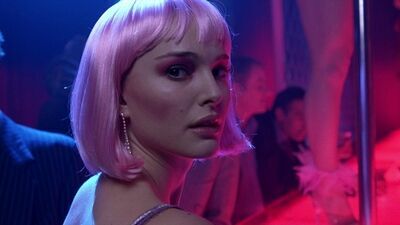It’s fascinating to think about Portman making “Garden State” and “Closer” in the same year, both codifying and subverting the “manic pixie dream girl” archetype. In the former, she’s quirky in ways that feel unnatural, as if written by someone who was trying to come up with the ideal woman and ended up with a woman-child, odd and inconsistent. But as Alice, Portman is playing a young woman who wants to be a fantasy. She chooses to live out a love story that’s grand and never-ending. When she meets Dan, she tells him her name is Alice (as in Wonderland) when it isn’t. She is a fantasy from the beginning. It was in that moment that she began the narrative of their love, the beautiful tale of Dan and Alice. We don’t know if she’s done this before, rehearsing her lines in the bathroom mirror and meticulously creating an image. Early on, she mentions that she recently left someone in New York. Arriving in London with the intent to fall in love, she finds Dan and is instantly smitten, maybe because he is captivated by her. With no other ambitions, she works as a waitress and lives as his muse. But soon enough the fantasy becomes too easy for Dan. His need to yearn for someone becomes overwhelming. With Anna, he reinvents himself as a man trapped in a fantasy looking for a way out.
In many ways, Anna is the antidote. Roberts plays her like a cold shower, constantly reminding Dan that they are not living in a fairytale and his reasons for pursuing her are not noble. Even when she meets him, she clocks his arrogance, but when they kiss she buries her head into his chest. She knows he’s a liar, but it’s a lie she’s never succumbed to before. It’s a fascinating role for Roberts to play after being America’s Sweetheart in the ’90s. Her performance in “Closer”—especially in the wake of her Oscar-winning turn in “Erin Brockovich”—feels like a turning point for Roberts. Here she transforms from the sweetheart to the world-weary woman, still beautiful, still charming, but no longer naive about love. Anna knows Alice is seen as a fantasy because that used to be her. Now, on the other side of it, she goes for Dan because she wants some of that old magic back. But it’s Alice who gives it to him. He doesn’t have it without her.

What does it mean that Alice knows what she’s doing? Portman plays the character as someone much smarter than she looks, but uninterested in other people knowing, still hiding who she really is. Like many women in their early 20s, Alice knows that she’s being judged and evaluated on everything from her clothes to the way she speaks. She takes that knowledge and tries to get ahead of it, play into it and master it. But does it make her happy? Is knowing the game enough of a reason to play it? And what does playing this part do for Alice? It clearly did something for Portman, whose best performances are all about diving into a role. From “Closer,” to “Black Swan” and “Vox Lux” to last year’s “May/December,” Portman has excelled at being an actress who knows she’s being watched and behaves accordingly.

